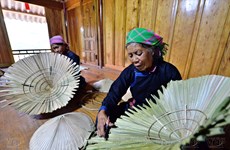Record book honours monk
The Vietnam Records Book has recognised Most Venerable Thich Giac Toan
as an individual who translated the most Zen poems written during the Ly
and Tran dynasties (10th-14th century) from Han (classical Chinese
language) into Vietnamese in the luc bat style (a six-word sentence
followed by an eight-word sentence).
The Vietnam Records Book has recognised Most Venerable Thich Giac Toan
as an individual who translated the most Zen poems written during the Ly
and Tran dynasties (10th-14th century) from Han (classical Chinese
language) into Vietnamese in the luc bat style (a six-word sentence
followed by an eight-word sentence).
The Most Venerable Thich Giac Toan, whose pen name is Tran Que Huong, on Sept. 18, released a book Huong Thien Ngan Nam (The Spirit of Zen in Thousand Years) featuring 120 Zen poems written by Buddhist priests of the Ly and Tran dynasties. It includes 2,783 sentences.
The 700-page book, written from the beginning of the Lunar New Year to July, opens with a poem by priest La Quy and ends with a poem by priest Huyen Quang.
The Most Venerable Thich Giac Toan said he had decided to translate words featuring Buddhism from Han to Vietnamese in “luc bat” because all Vietnamese, from intellectuals to ordinary folk, hear this style of poetry even when they are newborns.
"So a luc bat poem is easy to enter readers' hearts," he said.
The book is a gift to Hanoi to celebrate the ceremony of the city's 1,000th anniversary.
The HCM City General Publishing House will print 15,000 copies of the book. Of those, 12,000 copies will be given to monks and nuns across the country while the remaining will be sold at bookstores nationwide.
The Most Venerable Thich Giac Toan became a monk at the age of 14 in the Mekong Delta's province of My Tho , and in the late 1960s began to write under the pen-name of Tha Phuong Khach. In the 1970s, he issued two poem books including Tang Pham Cho Doi (Gifts for People). In 1980, he changed his pen-name to Tran Que Huong.
The Most Venerable Thich Giac Toan is vice chairman of the HCM City Buddhist Sangha's Executive Board and deputy editor-in-chief of Giac Ngo newspaper./.
The Most Venerable Thich Giac Toan, whose pen name is Tran Que Huong, on Sept. 18, released a book Huong Thien Ngan Nam (The Spirit of Zen in Thousand Years) featuring 120 Zen poems written by Buddhist priests of the Ly and Tran dynasties. It includes 2,783 sentences.
The 700-page book, written from the beginning of the Lunar New Year to July, opens with a poem by priest La Quy and ends with a poem by priest Huyen Quang.
The Most Venerable Thich Giac Toan said he had decided to translate words featuring Buddhism from Han to Vietnamese in “luc bat” because all Vietnamese, from intellectuals to ordinary folk, hear this style of poetry even when they are newborns.
"So a luc bat poem is easy to enter readers' hearts," he said.
The book is a gift to Hanoi to celebrate the ceremony of the city's 1,000th anniversary.
The HCM City General Publishing House will print 15,000 copies of the book. Of those, 12,000 copies will be given to monks and nuns across the country while the remaining will be sold at bookstores nationwide.
The Most Venerable Thich Giac Toan became a monk at the age of 14 in the Mekong Delta's province of My Tho , and in the late 1960s began to write under the pen-name of Tha Phuong Khach. In the 1970s, he issued two poem books including Tang Pham Cho Doi (Gifts for People). In 1980, he changed his pen-name to Tran Que Huong.
The Most Venerable Thich Giac Toan is vice chairman of the HCM City Buddhist Sangha's Executive Board and deputy editor-in-chief of Giac Ngo newspaper./.













